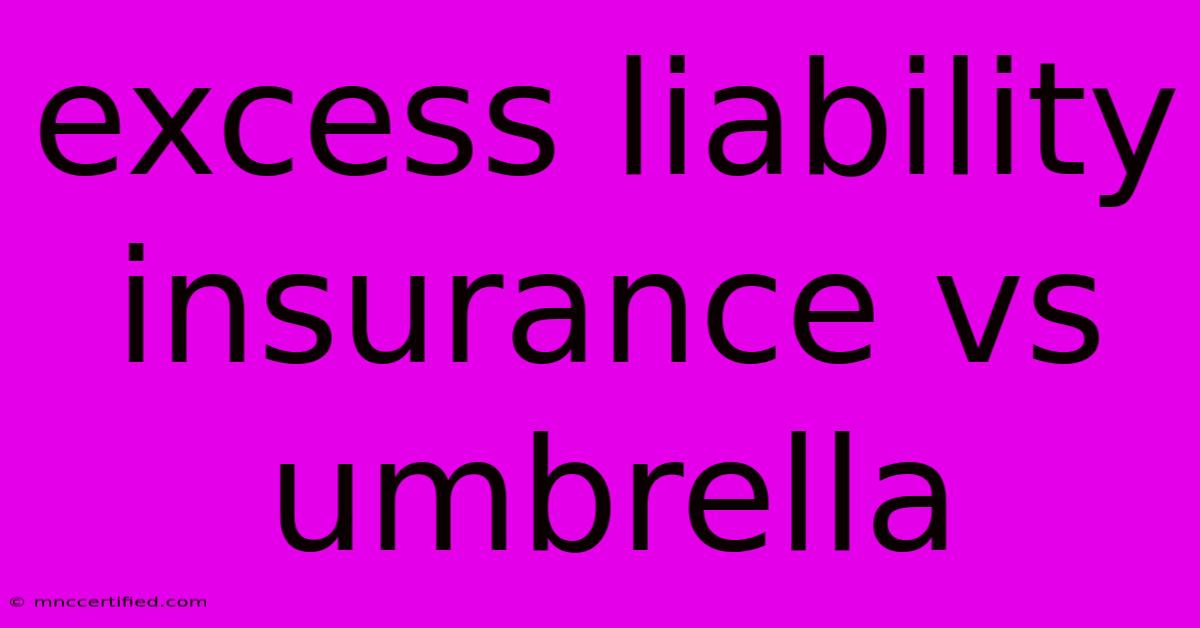Excess Liability Insurance Vs Umbrella

Table of Contents
Excess Liability Insurance vs. Umbrella Insurance: What's the Difference?
When it comes to protecting your assets from significant financial risks, understanding the differences between excess liability insurance and umbrella insurance is crucial. While both provide additional coverage beyond your primary insurance policies, they operate in distinct ways, each offering specific advantages.
This article aims to demystify these two insurance types, outlining their key features, benefits, and limitations. By understanding the nuances, you can make an informed decision about which option best suits your individual needs.
Understanding the Basics
Excess liability insurance, often referred to as excess liability coverage, functions as an extension to your existing liability insurance policies. It provides coverage above and beyond the limits of your primary policies, acting as a safety net for situations exceeding your standard coverage. For instance, if you have a $1 million liability limit on your homeowner's insurance and face a claim exceeding that amount, excess liability insurance steps in to cover the difference.
Umbrella insurance, on the other hand, is a broader type of coverage that acts as a separate policy altogether. It provides an additional layer of protection, extending your liability coverage across multiple areas, including your home, auto, and personal liability. Unlike excess liability insurance, umbrella insurance doesn't rely on your primary policies. Instead, it acts as a stand-alone policy, offering a higher limit of coverage that kicks in after your underlying policies have been exhausted.
Key Differences:
Here's a table highlighting the key differences between excess liability insurance and umbrella insurance:
| Feature | Excess Liability Insurance | Umbrella Insurance |
|---|---|---|
| Type of Coverage | Extends existing liability policies | Stand-alone policy |
| Coverage Limit | Covers amounts exceeding primary policy limits | Provides higher overall liability coverage |
| Trigger | Activates only after primary policy limits are reached | Offers coverage beyond primary policy limits and sometimes provides additional coverage for specific situations |
| Coverage Areas | Specific to the primary policy it supplements (e.g., homeowner's insurance) | Covers multiple areas, including home, auto, and personal liability |
Benefits of Excess Liability Insurance:
- Increased Coverage: Provides additional protection for specific liabilities.
- Affordability: Generally more cost-effective than umbrella insurance.
- Targeted Coverage: Tailored to specific situations like high-value assets or businesses.
Limitations of Excess Liability Insurance:
- Limited Scope: Only extends existing liability coverage.
- Dependent on Primary Policy: Doesn't provide coverage if the underlying policy doesn't cover the claim.
Benefits of Umbrella Insurance:
- Broader Coverage: Protects multiple areas, offering a wider range of protection.
- Higher Limits: Offers significantly higher coverage limits compared to primary policies.
- Additional Coverage: May cover specific situations not covered by underlying policies, like certain lawsuits or injuries.
Limitations of Umbrella Insurance:
- Higher Cost: Generally more expensive than excess liability insurance.
- May Require Underlying Coverage: Some policies require minimum coverage on underlying policies.
Choosing the Right Option:
The best choice depends on your individual needs and risk profile. Consider the following factors:
- Asset Value: If you have significant assets like a home, investments, or valuable possessions, umbrella insurance offers broader protection.
- Liability Risks: High-risk activities like owning a pool, hosting large gatherings, or engaging in business ventures may necessitate umbrella insurance.
- Budget: Excess liability insurance is often more cost-effective for specific situations, while umbrella insurance provides comprehensive protection at a higher cost.
Consult with an insurance professional to assess your specific situation and determine the most suitable option for your individual needs.
Conclusion:
Understanding the distinctions between excess liability insurance and umbrella insurance is crucial for making informed decisions about your financial protection. While excess liability insurance provides targeted coverage for exceeding primary policy limits, umbrella insurance offers a broader, more comprehensive safety net with higher coverage limits. By weighing your unique circumstances, you can choose the most effective option to safeguard your assets and protect your financial well-being.

Thank you for visiting our website wich cover about Excess Liability Insurance Vs Umbrella. We hope the information provided has been useful to you. Feel free to contact us if you have any questions or need further assistance. See you next time and dont miss to bookmark.
Featured Posts
-
Bhad Bhabies Mom Slams Faking Claims As Disgusting
Nov 09, 2024
-
The Rise Of The Floridian Right Susie Wiles Role
Nov 09, 2024
-
Actor James Van Der Beek Battles Colorectal Cancer
Nov 09, 2024
-
Pasture Rangeland And Forage Insurance
Nov 09, 2024
-
Bronny James G League Assignment Postpones Lakers Father Son Duo
Nov 09, 2024